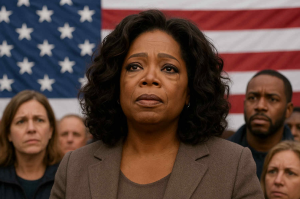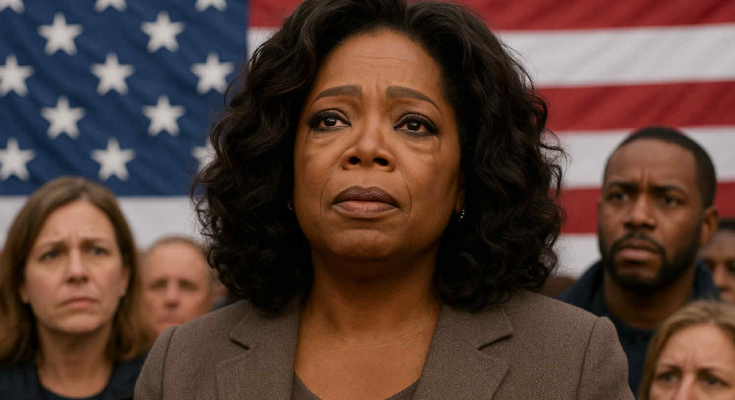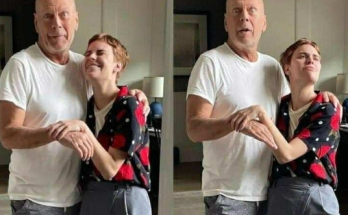“The Weight of a Name: Oprah’s Quiet Emergency”
It was a Tuesday morning in June when the absence of one woman rippled across the media world like a dropped stone in still water. Oprah Winfrey, scheduled to appear on CBS Mornings to announce her latest book club pick, was nowhere to be seen. Her longtime friend and co-host Gayle King sat in her place, visibly concerned, and then—without ceremony—delivered the news.
“She had some kind of stomach thing,” King said. “Stuff was coming out of both ends.”
The words were blunt, almost jarring. But beneath the awkward phrasing lay a deeper truth: Oprah Winfrey, the woman whose name had become synonymous with strength, empathy, and resilience, had been rushed to the emergency room with a severe stomach virus. She was dehydrated, weak, and unable to board a plane. For someone who had spent decades commanding stages, airwaves, and boardrooms, the vulnerability was striking.
And yet, it was also human.
Oprah’s spokesperson later clarified: “Ms. Winfrey is recovering following a stomach virus and received an IV due to dehydration at the recommendation of her doctor. She is resting and feeling better every day”.
But the headlines had already taken flight. “Oprah Hospitalized in Critical Condition,” they screamed, igniting concern, speculation, and a wave of public sympathy. Fans flooded social media with messages of support. “Feel better and get rest, Lady O,” one wrote. “We are all here for you.”
The truth, as Oprah herself later explained in a Zoom call with King, was less dramatic than the headlines suggested. “I couldn’t keep enough water down to stay hydrated,” she said. “So I went to the emergency room for that, and that’s just it”.
Still, the moment lingered.
Because when someone like Oprah Winfrey falls ill, it feels like more than just a personal health scare. It feels like a cultural tremor. She is not just a celebrity. She is a symbol. A vessel of hope, transformation, and hard-earned wisdom. Her voice has guided millions through grief, trauma, reinvention. Her presence has been a constant—steady, radiant, unshakable.
So when she disappears, even briefly, the silence is deafening.
Oprah is 70 now. And while she remains active, vibrant, and deeply engaged in her work, there’s a quiet shift happening. A reckoning with age, legacy, and mortality. In December, she spoke candidly about adding weight-loss medication to her regimen, acknowledging her past role in promoting unhealthy diet culture. “I own it,” she said. “I now realize I was part of the problem.”
It was a rare moment of public self-reflection. And it made her hospitalization feel even more poignant. Not because she was in critical danger—but because it reminded us that even icons are fragile.
The stomach virus—gastroenteritis, doctors later confirmed—was not life-threatening. But it was humbling. It forced Oprah to cancel appearances, rest, and recover. It forced her to be still.
And in that stillness, something profound emerged.
Oprah’s health scare became a mirror. Not just for her, but for all of us. A reminder that strength is not the absence of weakness, but the ability to face it with grace. That even the most powerful among us are vulnerable to the body’s betrayals. That healing is not just physical, but emotional, spiritual, communal.
Gayle King, ever the loyal friend, worried she had triggered sensational headlines. “I hope she’s not mad at me,” she said. Oprah, ever the diplomat, reassured her. “Everyone I’ve ever known who has access to my email called me to ask if I’m all right.”
It was a moment of levity. But also of connection.
Because Oprah Winfrey is not just a media mogul. She is a woman who has built her empire on empathy. Who has turned personal pain into public purpose. Who has made space for stories that would otherwise be silenced.
And now, her own story—brief, messy, human—was unfolding in real time.
She didn’t hide it. She didn’t spin it. She simply told the truth.
“I’m not 100 percent,” she admitted. “But I’m getting there.”
That honesty mattered. In a world obsessed with perfection, her vulnerability was a gift. A reminder that healing is not linear. That rest is not weakness. That even Oprah Winfrey needs a break.
The book she was meant to promote—Familiaris by David Wroblewski—was quietly announced later on Instagram. Oprah appeared in the photo, smiling, makeup flawless, hair immaculate. But the caption was softer, more reflective. “Summer is here,” she wrote, “and I love to settle in with a big book that takes me through the season.”
It was a return to normalcy. But also a subtle nod to the storm she’d weathered.
And perhaps that’s the real story.
Not the hospitalization. Not the IV drip. Not the headlines.
But the quiet resilience of a woman who has spent her life lifting others—and now, in her own moment of need, allowed herself to be lifted.
Oprah Winfrey is recovering. She is resting. She is healing.
And in doing so, she is reminding us all: even legends need care.


